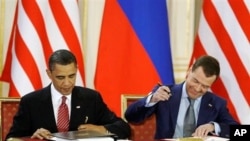Two years ago, the United States launched its "Reset" policy towards Russia. The policy has been successful, leading to a much improved climate of relations, and concrete achievements such as the New Start Treaty. European nations — including Germany and Poland — have pursued their own version of "Reset."
In a recent speech to the Atlantic Council, U.S. Assistant Secretary of State for Arms Control, Verification and Compliance Rose Gottemoeller said the New Start Treaty implementation is "going very well. It's been a bright spot in the U.S.-Russian relationship and we see it continuing to be an area of positive cooperation." The new treaty is simpler to implement than the previous START Treaty and it lessens disruptions to the day-to-day operations of both sides' strategic forces, while allowing for effective verification of the treaty.
On-site inspections are underway and the U.S. has now conducted nine inspections in Russia and Russia has conducted eight inspections in the U.S. The new START Treaty data exchanges are providing the United States with a very detailed picture of Russian strategic forces and the inspections will give the U.S. opportunities to confirm the validity of that data. The treaty's verification regime is backed up by satellites and other monitoring platforms.
The United States is committed to continuing a step-by-step process to reduce the overall number of nuclear weapons including the pursuit of a future agreement with Russia for broad reductions in all categories of nuclear weapons – strategic and non-strategic; deployed and non-deployed. The United States will continue to consult with NATO on the development of transparency initiatives.
With regard to missile defense, cooperation with Russia is a U.S. priority. "We have been clear," said Assistant Secretary Gottemoeller, "that the United States cannot accept limitations or restrictions on the development or deployment of U.S. missile defenses. We do believe, however, that missile defense cooperation with Russia will strengthen our bilateral and NATO-Russia relationships and could enhance NATO's missile defense system." Persistent misperceptions about the capabilities of the proposed NATO system, specifically that the system would target Russian Intercontinental Ballistic Missiles or undermine Russia's strategic deterrent, are unfounded.
The United States looks forward to continuing its work with Russia, striving to achieve a safer world in which there is strategic stability for the long term with fewer nuclear weapons.
Russia - Moving The Reset Forward

The policy has been successful, leading to a much improved climate of relations, and concrete achievements such as the New Start Treaty.

















